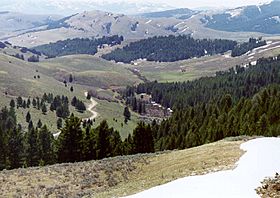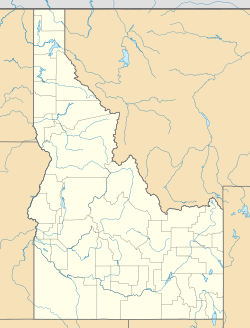Lemhi Pass facts for kids
Quick facts for kids Lemhi Pass |
|
|---|---|

View from Lemhi Pass
|
|
| Elevation | 7,373 ft (2,247 m) |
| Traversed by | Unpaved road |
| Location | Lemhi County, Idaho / Beaverhead County, Montana, |
| Range | Bitterroot Range of the Rocky Mountains |
| Coordinates | 44°58′27″N 113°26′42″W / 44.97417°N 113.44500°W |
|
Lemhi Pass
|
|
| Nearest city | Tendoy, Idaho |
|---|---|
| NRHP reference No. | 66000313 |
| Significant dates | |
| Added to NRHP | October 15, 1966 |
| Designated NHL | October 9, 1960 |
Lemhi Pass is a high mountain pass located in the Rocky Mountains. It sits on the border between Montana and Idaho. This special place is part of the Continental Divide. This means it's where rivers on one side flow to the Pacific Ocean and rivers on the other side flow to the Atlantic Ocean.
Lemhi Pass is about 7,373 feet (2,247 m) (2,247 meters) above sea level. You can reach it by driving on dirt roads. These roads are called Lemhi Pass Road in Montana and the Lewis and Clark Highway in Idaho.
History of Lemhi Pass
Lemhi Pass became very important in the 1700s. The Lemhi Shoshone people used this route often. They traveled across it to move between different parts of their homeland.
Lewis and Clark Expedition
In 1805, the famous Lewis and Clark Expedition reached Lemhi Pass. This was a big moment for them. On August 12, 1805, Meriwether Lewis and three other explorers crossed the pass. They were the first non-Native Americans to see what is now Idaho. Lewis wrote about seeing "immense ranges of high mountains" to the west.
The next day, Lewis met Cameahwait, a leader of the Shoshone people. Cameahwait and his group helped Lewis and Clark. On August 26, 1805, the entire expedition crossed Lemhi Pass.
Later Use and Name
In the early 1800s, the Blackfoot people also used the pass regularly. It was even known as North Pass back then.
The pass got its current name from Fort Lemhi. This fort was built in 1855 by Mormon missionaries. They were the first non-Native Americans to have a lasting connection with the local Native American people.
Later, during a time of mining, stagecoaches used the pass. But after 1910, a railroad was built nearby. This made the pass less used. Today, only a single dirt road crosses it.
Lemhi Pass is also a very important historical site. In 1960, it was named a National Historic Landmark. This means it's a place with special historical importance to the United States.
Minerals at Lemhi Pass
The area around Lemhi Pass has some interesting minerals. Scientists have found many lanthanide minerals here. These are also known as rare-earth elements (REEs). It also has a lot of thorium, which is a special element.
These minerals are found in quartz veins in old rocks. Some of the rare-earth elements found include neodymium, cerium, gadolinium, yttrium, and dysprosium.
 | Roy Wilkins |
 | John Lewis |
 | Linda Carol Brown |



